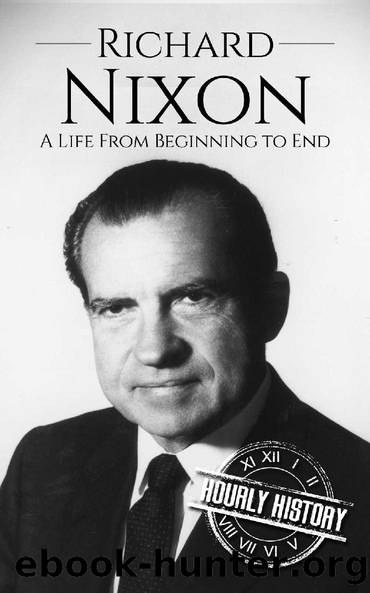Richard Nixon: A Life From Beginning to End (Biographies of US Presidents Book 37) by Hourly History

Author:Hourly History [History, Hourly]
Language: eng
Format: epub
Publisher: Hourly History
Published: 2017-05-16T00:00:00+00:00
Chapter Five
President at Last
âAnd so tonightâto you, the great silent majority of my fellow AmericansâI ask for your support.â
âRichard Nixon
Nixonâs distance from politics proved to be fortuitous; he was not culpable for the embarrassing losses of the 1964 election. However, the situation was entirely different in 1968. The Vietnam War had made a dramatic change in the American chessboard, and the Democrats were in disarray; President Johnson, who inherited the war, had watched helplessly as opposition to it hijacked his presidency, and he had announced that he would not run for re-election in 1968.
The country in 1968 was sharply divided, not only by the Vietnam War that had galvanized the student protest movement but also by civil rights, womenâs rights, the youth culture, and other causes that bubbled up to the surface from the cauldron of the decade of dissent. Martin Luther King, Jr, was assassinated in April; in June, Democratic presidential candidate Robert F. Kennedy lost his life to an assassinâs bullet, the same fate that had befallen his brother, Nixonâs 1960 opponent.
The Republicans also had their factions. Other candidates for the nomination included Nelson Rockefeller of New York, George Romney of Michigan, and Ronald Reagan of California, but Nixon won the nomination on the first ballot, avoiding a brokered convention. His running mate, Spiro Agnew, was the governor of Maryland and the balance of the ticket gave the Republicans hope that they would appeal to moderates in the north and offer an alternative to the Southern Democrats, who were disenchanted with their partyâs civil rights stance.
Protests at the Democratic convention in Chicago reinforced the image of the party as one of chaos and lawlessness, a sharp contrast to Nixonâs presentation as a firm leader. Nixon would later use the phrase âthe silent majorityâ to refer to the Americans who disapproved of the counterculture and the protests and wanted their country to reflect traditional values. Alabamaâs George Wallace, a vehement opponent of integration, was a third party candidate.
Nixon had learned from Henry Kissinger, who was working with one of the governmentâs negotiators, that the president of South Vietnam had been advised not to take part in the Paris Peace Talks because Nixon might offer better options in the negotiations than Johnson would offer. Johnson knew that behind-the-scenes skulduggery was taking place and told his Vice President, Hubert Humphrey, who was the Democratic candidate, but Humphrey decided not to capitalize on the inside information that Johnson had obtained by bugging the South Vietnamese representatives.
Nixon won the office he had coveted for so long. Vietnam was an immediate priority. Nixon began his first term well aware of what the long shadow of Vietnam had done to Lyndon Johnsonâs presidency, and he was determined to avoid the curse. Ongoing anti-war protests were a constant reminder of just how much the country was divided over the Asian conflict. Nixon promoted a concept called Vietnamization, which would lower the number of troops in the country as the South Vietnamese stepped up the pace in defending their country.
Download
This site does not store any files on its server. We only index and link to content provided by other sites. Please contact the content providers to delete copyright contents if any and email us, we'll remove relevant links or contents immediately.
Blood and Oil by Bradley Hope(1558)
Wandering in Strange Lands by Morgan Jerkins(1419)
Ambition and Desire: The Dangerous Life of Josephine Bonaparte by Kate Williams(1385)
Daniel Holmes: A Memoir From Malta's Prison: From a cage, on a rock, in a puddle... by Daniel Holmes(1332)
Twelve Caesars by Mary Beard(1313)
It Was All a Lie by Stuart Stevens;(1294)
The First Conspiracy by Brad Meltzer & Josh Mensch(1167)
What Really Happened: The Death of Hitler by Robert J. Hutchinson(1159)
London in the Twentieth Century by Jerry White(1145)
The Japanese by Christopher Harding(1131)
Time of the Magicians by Wolfram Eilenberger(1125)
Twilight of the Gods by Ian W. Toll(1117)
Cleopatra by Alberto Angela(1094)
A Woman by Sibilla Aleramo(1092)
Lenin: A Biography by Robert Service(1074)
John (Penguin Monarchs) by Nicholas Vincent(1068)
The Devil You Know by Charles M. Blow(1024)
Reading for Life by Philip Davis(1023)
The Life of William Faulkner by Carl Rollyson(983)
